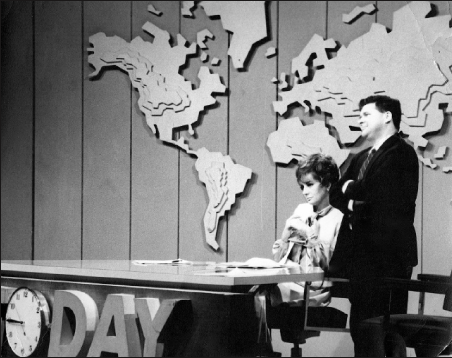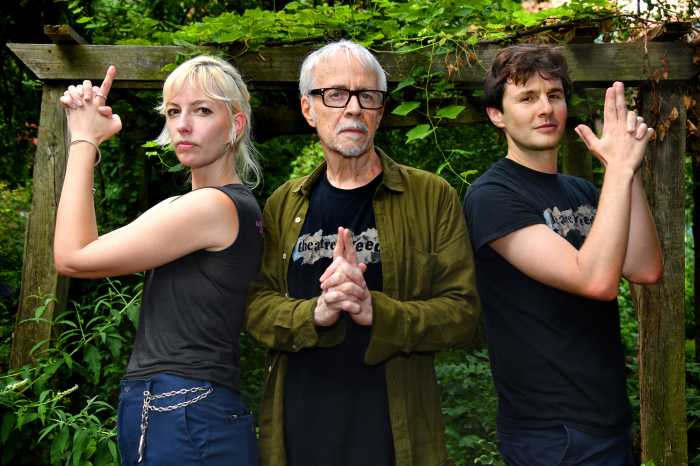By Leslie Fuller
Robert Cunniff, an Emmy Award-winning television writer and producer, died Jan. 20 in Brooklyn after a long illness. He was 81.
Cunniff was a longtime Village resident, living first on Christopher St., then for more than 40 years on Washington Square.
As a writer for “The Today Show” in the mid-’60s, he worked closely with Hugh Downs and Barbara Walters, then the country’s first female TV anchor. Cunniff was often credited with elevating that program’s news reputation with what was then unusually penetrating coverage, for a morning show, of the Vietnam War, the riot-ridden 1968 Chicago Democratic Convention, U.S. political assassinations and the emerging American drug and music culture. Cunniff also helped launch “broadcast news” into the satellite era with the first Early Bird satellite broadcast, from Rome, where Cunniff also wrote a speech for Pope Paul VI, which garnered him a nickname, “The Holy Ghost Writer.”
From 1969-’72 Cunniff’s wit brightened the late-night version of “The Dick Cavett Show” on ABC, much of whose content has been newly released on DVD and repeated on the A&E Network. Cunniff’s formidable knowledge came in handy on this high-profile series, such as the time in 1971 when he booked Norman Mailer and Gore Vidal on the same show, and then, correctly anticipating a blistering intellectual row, flew in the elderly, mild-mannered New Yorker writer Janet Flanner as, he said, “referee.”
Cunniff’s often provocative contributions to the Cavett show during its most influential era included booking Salvador Dali, Lillian Gish and Satchel Paige, on a single program, in 1970. It was a popular, unpredictable show on which one guest died (publisher J. I. Rodale, in 1971) and another walked off in rage (former Georgia Governor Lester Maddox, in 1970). It was also, for Cunniff, a chance to spice up the standard talk show format with what was then an unusually rich offering of live rock music, such as the appearance — fresh off the Woodstock concert stage, some of them with Woodstock mud still on their boots — of Janis Joplin, Jimi Hendrix, Crosby Still & Nash and Joni Mitchell.
Cunniff’s prominence “behind the scenes” in TV in the 1970s inspired The New Yorker magazine to publish a cartoon showing him plotting the elements of a daily TV talk show on a bulletin board.
A devoted film buff, Cunniff was also the force behind Ingmar Bergman’s and Laurence Olivier’s first appearances on an American TV talk program, another Cavett show milestone. It was even Cunniff who selected what became known as the Cavett theme song: “Glitter & Be Gay” from Leonard Bernstein’s “Candide.” Cunniff reprised his role as a primary editorial force behind Cavett when the host returned to public television in the early 1980s and then to CNBC in the 1990s.
From 1972-’75, Cunniff was a producer for “Sesame Street” for which he wrote countless memorable sketches, winning, along with the show’s creator, Jon Stone, the Emmy for Outstanding Achievement In Children’s Programming in 1973.
In 1976, Cunniff signed on as managing editor of “Good Morning America.”
One of his most enduring achievements is the long-running, critically acclaimed Disney Channel hit “Mouseterpiece Theater,” a parody of “Masterpiece Theater,” conceived, produced and co-written by Cunniff in 1983. Now a cult classic, the series featured vintage Disney cartoon shorts outlandishly introduced by George Plimpton in a saucy sendup of Alistair Cooke.
Cunniff came to New York in 1953. He had a passion for the choreography of George Balanchine and was able to celebrate Balanchine and many other artists he admired, during his tenure as a writer with “Live From Lincoln Center” on PBS in the 1970s. A lifelong jazz and classical music aficionado, he was one of the first to bring live jazz to national television, when as a young writer for “The Today Show” he created a groundbreaking multipart concert series with another idol, Duke Ellington.
First and always a writer, Cunniff’s early freelance features for Newspaper Enterprise Association, Show Business Illustrated and Show Magazine led to his first job in television, in 1961, as co-writer — with John Mosedale and Andy Rooney — and editor for CBS News’s pioneering live, daytime series “Calendar,” anchored by Harry Reasoner.
Robert Rody Cunniff was born Sept. 13, 1926, in Chicago, eighth of nine children born to Elizabeth and Luke Cunniff, a longtime associate with the Chicago Democratic Party and the Mayor’s Office. He served in the U.S. Navy in the Pacific in World War II, one of five brothers who returned from overseas military service, a test of family patriotic sacrifice; the “Sullivan Act” did not apply since not all the brothers were in the same military branch.
After earning his master’s degree in literature from the University of Chicago on the G.I. Bill, Cunniff went on to write for the Chicago Sun Times and TV Guide, a job he was forced to leave in 1953 after what was perceived as a conflict of interest — his winning $4,750 on the TV quiz show “Break the Bank.”
He bounced back with a highly successful syndicated newspaper column about television with childhood friend Tom O’Malley. “Cunniff and O’Malley,” launched in 1954, was shut down three years later after running with the sensational report that “What’s My Line?” panelist Dorothy Kilgallen could see through her mask.
Cunniff is survived by his daughter, Jill Cunniff Gregoire; son, Stephen Cunniff, both of New York; longtime companion, Kate Resek; granddaughters, Chloe and Piper Gregoire and Madeline Cunniff; and a brother, Joseph Cunniff, of Chicago.
A memorial service was held on Feb. 9 at the Unitarian Church of All Souls, at Lexington Ave. and E. 80th St. Donations may be made in memory of Robert Cunniff to the fund to preserve New Orleans’ Jazz Heritage at The Tipitina’s Foundation, 4040 Tulane Ave., Ste. 8000, New Orleans, La. 70119.





































